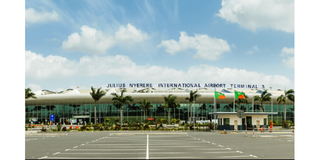TCAA to fully liberalise ground handling services

What you need to know:
Fully liberalisation of the market will mean multiple handlers scrambling to serve 24 airlines flying into and out of various airports across Tanzania.
Dar es Salaam. The Tanzania Civil Aviation Authority (TCAA) intends to fully liberalise airport ground handling services to boost competition in the industry.
The decision comes even as the current service providers – Swissport Tanzania and Nas-Dar Airco – have been complaining that the market is too small to accommodate a third handler, Celebi Tanzania Aviation Services Limited, at Julius Nyerere International Airport (JNIA), for instance.
Fully liberalisation of the market will mean multiple handlers scrambling to serve 24 airlines flying into and out of various airports across Tanzania.
However, ground handlers who spoke to The Citizen yesterday cautiously welcomed the plan.
They nevertheless advised the regulator to set caps on charges to avert a price war which they said would be unhealthy for the prosperity of aviation.
Their suggestion was in response to the authority’s announcement of its intention to bring about effective competition by allowing market forces to determine the cost of services.
“Market forces will determine rates, charges, quality of services and the number of effective and efficient service providers to persist in the market,” says a TCAA notice seen by The Citizen yesterday.
The regulator said limiting the number of ground handling service providers inhibited effective competition, and might lead to inflated charges.
Soaring charges could be triggered by possible business cartels, or dominance of monopoly powers that may be caused by price wars between two service providers in case one is driven out of business.
TCAA came up with the plan to fully liberalise the ground handling business after it realised that passenger traffic, aircraft movements, as well as outbound and inbound cargo have been steadily growing year after year.
The regulator also came with the commitment after being satisfied with airport infrastructure that has steadily improved in terms of facilities, size and technology.
Considering the fact that every airport has its specific needs that are different from others, TCAA believes it is proper to provide an opportunity for airports to assess and come up with proposed optimal numbers of ground handling operators to serve the facilities.
The authority will thereafter assess the proposals and decide on merits based on economic and airport infrastructural criteria.
The Nas Dar Airco corporate and government relations head, Mr Evans Mlelwa, said there was nothing wrong with competition, but the regulator should control prices.
He cautioned that unless TCAA set price caps, airports would be attractive, but operators and airports would get less revenue.
“Less revenue for operators could mean low concession fee which, depending on the airport class, accounts for between 10 to 15 percent of operators’ gross revenue,” said Mr Mlelwa.
On the other hand, he said, less revenue for ground handlers was likely to adversely affect investment in equipment, training, and safety, and thus adversely affect uality of services.
TCAA acting director general Daniel Malanga said the authority would collect views from aviation stakeholders and the general public to help the board of directors in decision-making.
“We will have a public forum on April 25, 2022 that will seek to collect opinions,” said Mr Malanga, who also doubles as the TCAA’s economic regulation director.
“We must engage stakeholders to have their opinions and gauge them (opinions) before making a decision.”
Celebi board director Gaudence Temu cautiously welcomed the liberalisation, recommending TCAA to closely follow up the implementation so that operators do not lower standards.
“Focus of every operator should be on safety, maintenance and investment in new equipment,” recommended Mr Temu, noting that this would enable them to deliver in accordance with the set standards.
On the other hand, he said, the fully liberalisation offered an opportunity for investors to expand their investment as they would now be able to have multiple concessions to operate at various airports.
“This could offer consistency in service delivery and it is on those grounds that airline customers would wish to be served by the same ground handler in multiple stations,” stressed Mr Temu.





